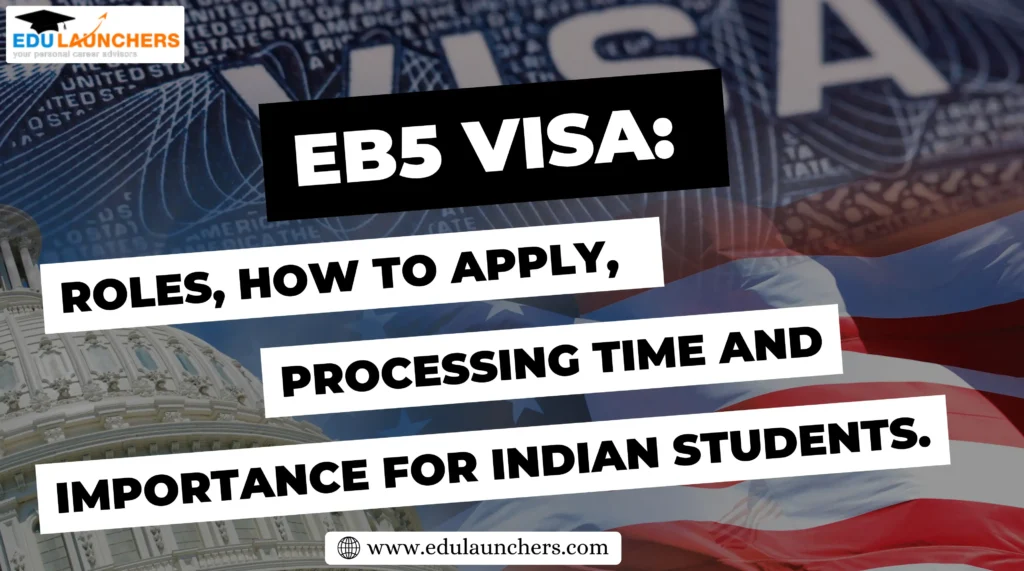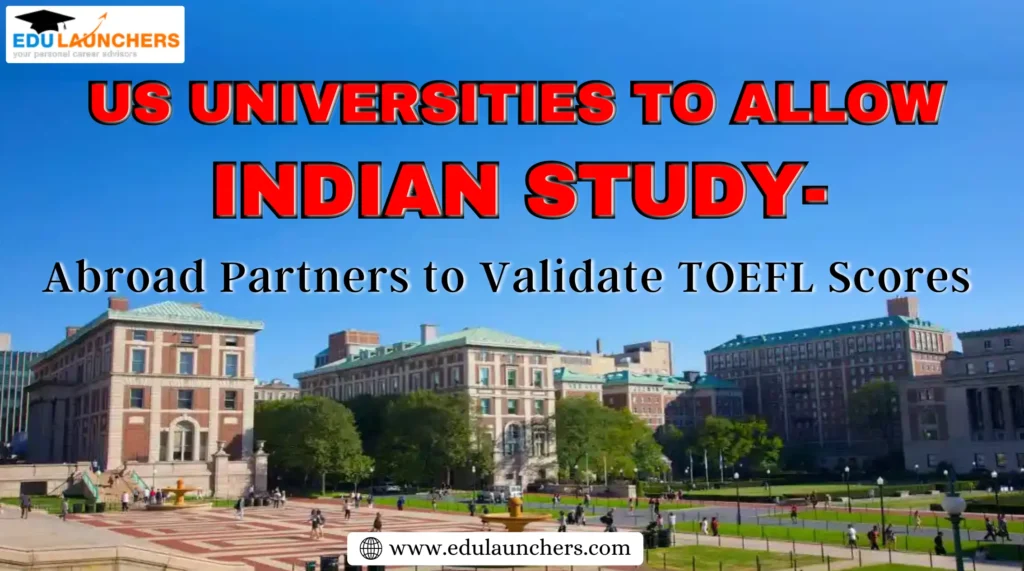Study in Singapore
Why Study in Singapore?
Singapore is a vibrant country with the most attraction to the foreign crowd. Famous for its world-class universities, diverse cultures, and high-quality academics, Singapore provides the best quality experience to students all around the globe. Singapore provides a leading-edge platform to everybody who wants to achieve high and best results.
- Be in a safe and clean environment
- High-quality education options
- Affordable options
- Gateway to Asian countries
- A blend of the multicultural population.
Quick Facts About Singapore
- Singapore is a small island city-state located in Southeast Asia.
- The country has a highly developed and booming economy with a strong focus on education. The most popular programs in Singapore include degrees in business, engineering, computer science, and law.
- Singapore is known for its high academic level and free public universities, making it one of the most popular destinations for students to study abroad.
- The country also has one of the best and most successful legislatures, and the crime rate is extremely low.
Benefits of Studying in Singapore
- Scholarship benefits for international students
- Best student-friendly cities
- Post-study work visa
- Easy and affordable cost of living
Higher Study Options
| Part-time work duration allowed | Post-study work permit | Can departments work full-time? |
Bachelors | 16 Hours per week | 2 Years | Yes |
Masters (MS/MBA) | 16 Hours per week | 2 Years | Yes |
Requirements for Students Applying to Singapore
To be eligible to study in Singapore, you must meet the following criteria:
Form 14A: form 14A contains basic personal and professional details of the applicant. This form is to be filled out by everyone who wants to travel to Singapore, it is also known as the Singapore entry visa application form. Fill out this form very carefully as incomplete information may lead to delays in visa processing.
Photograph: your photos must be passport-sized and should be taken within 90 days of the application.
Passport: A photocopy of your passport’s personal details page should be attached. Your passport should be valid for at least 6 months.
Letter of introduction for visa application: LoI is a document that specifies the details of why you are traveling into the country. This letter also has all the attached documents, itinerary, and final report for your acceptance and arrival.
Steps to Start Studying in Singapore
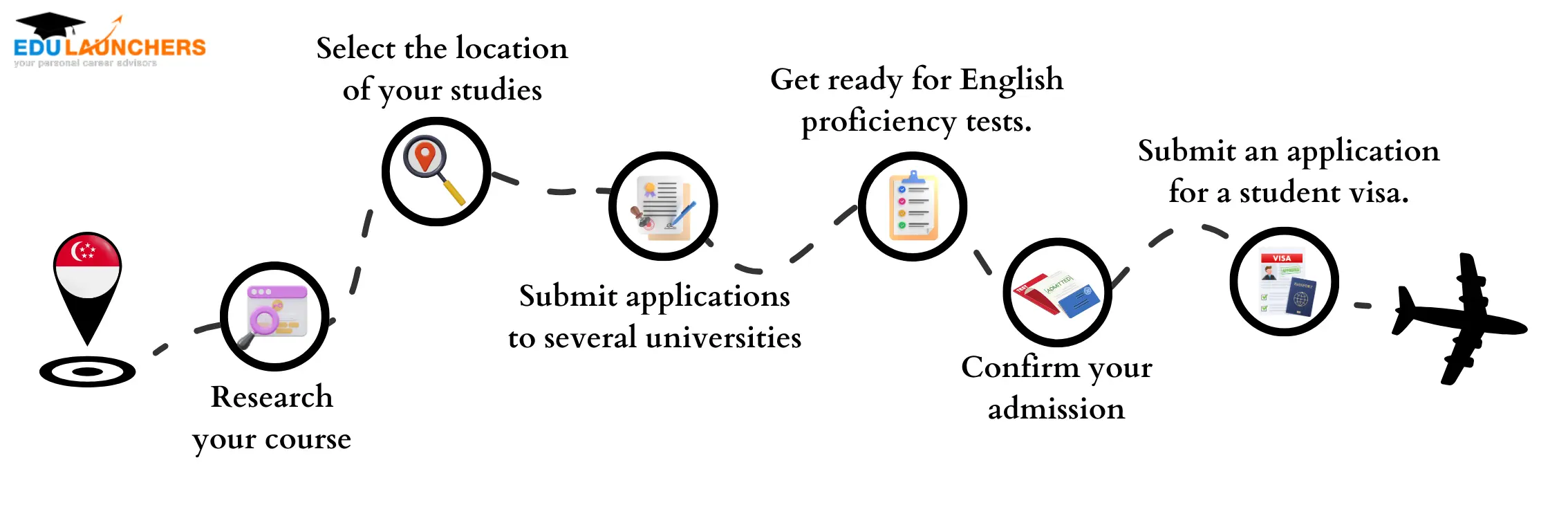
Eligibility to Study in Singapore
- Students should be at least 18 years old to start the application process.
- To qualify for graduation, a minimum of 65% must be attained from academic institutions and it is mandatory to qualify class 12 to start UG courses.
- A minimum of 65% is required in English and other subjects to get enrolled in universities but top universities requires around 80-90% for selection.
- A valid score is necessary in standard admission test, IELTS or TOEFL; these tests are to check reading/writing and common reasoning skills of the applicant.
- Score band for IELTS should be at least 5.7 – 6.0 and TOEFL score should be at least 90.
Educational Requirements to Study in Singapore
Study Options | Educational Requirement | Minimum Required Percentage | IELTS/TOEFL Score | Backlogs Information |
Bachelors | 12 Years of Education (10+2) | 65% | Overall, 6.0 with 5.7 in each band | Up to 10 backlogs (some private hospital universities may accept more) |
How Much Does It Cost to Study in Singapore?
It depends upon the study program you choose. The table below gives information about the course and average tuition fees.
Study program | Annual fees SGD |
Undergraduate Program | 25,000 – 40,000 |
Post-graduate/master’s Program | 30,000 – 50,000 |
Doctoral Degree | 35,000 – 45,000 |
Higher Study Options | Average Tuition Fee per Year (SGD) | Visa Fee (SGD) | Living Expenses for 1 Year (SGD) |
Bachelors | 25,000 and Above | 60 | 10,000 |
Masters |
Living Expenses: Living expenses usually include food, living space, transportation, and a few daily expenses. Depending on your lifestyle, Singapore is an expensive place to live. This value can range from 700 – 2,000 SGD.
Scholarships and Financial Aid: Universities in Singapore offer a variety of scholarships and monetary benefits for international students. Some universities provide money to the student while others can give a fee waiver to the student. Every student can fit into any scholarship plan. One just needs to find the best available offer for them.
| S.No | University Name | Tuition Fee* in S$ |
| 1. | Nanyang Technological University | 70,000.00 |
| 2. | Singapore Management University | 70,990.00 |
| 3. | National University of Singapore | 84,000.00 |
| 4. | Nanyang Institute of Management | 25,000.00 |
| 5. | Macquarie University | 41,200 |
| 6. | James Cook University | 32,100 |
| 7. | Amity Global Business School | 17,000 |
Upcoming Intakes in Singapore
Universities and colleges offer 2 intakes in Singapore. We recommend applying well in advance, as admissions and scholarships become more competitive as the deadline approaches. It is advisable to submit your application a few months before the commencement of the academic session for better chances of success.
Intake 1 | Intake 2 |
January | August |
Study Options | Duration | Intake Months | Deadline to Apply |
Bachelors | 3-4 Years | January and august | Application period is 3-4 months before the intake month |
Masters | 1.5-2 Years | January and august |
Popular Universities in Singapore
National University of Singapore (Only SCALE courses)
Curtin Singapore
S P Jain School of Global Management
Management Development Institute of Singapore (MDIS)
William Angliss Institute
James Cook University (JCU)
Nanyang Institute of Management
Kaplan Higher Education Academy (KHEA)

London School of Business and Finance

SIM Global Education
Top 4 Universities in Singapore 2024
Global rank | Universities |
8 | National University Of Singapore |
26 | Nanyang Technological University |
249 | Singapore University Of Technology And Design |
545 | Singapore Management Institute |
Scholarships Provided to Students
Scholarship name | Amount per year (SGD) |
Nanyang Technological University | 70,000 |
Singapore Management University | 70,000 |
National University of Singapore | 80,000 |
Macquarie University | 40,000 |
The Singaporean Universities/Colleges scholarship amounts and programs are subject to change, so it’s important to check the individual websites for the most recent details. Indian students should also confirm the requirements for eligibility and the application process.

Courses to Study in Singapore
- Hospitality and Tourism
- Business Administration
- Life Sciences and Healthcare
- Engineering and Technology
- Arts and Design
Types of Singapore Student Visa
Singapore is a country with only one visa – the student pass. But there are two types in this pass.
- Student pass based on the duration of the program
As per your requirement, you can apply for a long-term or short-term student pass. This is beneficial for those who are going to attend internship or diploma courses; this typically lasts for 3 months. For a full-length course, you have to apply for a long-term pass.
- Student pass based on the type of enlistment program
This pass contains the details about the details of the course you have selected. This includes all certificate courses and degrees that universities offer.
Singapore Student Visa Requirements
A valid passport: passports are the identification of your nationality, this document will be your primary ID, and it should be having an expiration date beyond the time span of your stay for educational purposes
Proof of acceptance: letter of acceptance will be the primary proof of your acceptance into the university. This letter is issued by the college or university and is filled with details of your course commencement and duration of your stay in the country.
Financial budget proof: Documents that shows the financial ability of your accounts to cover academic and living expenses is essential to get accepted into the country.
Leaving intent: Proof of a return as soon as the studies are completed is required by the country to show that the applicant has no intent staying illegally in the country.
Police clearance: a valid regular ensure is necessary to check the background of the student. This police clearance shows that applicant has no cases running or pending on his/her name. It also proves that the applicant is of good character and intent.
Statement of Purpose: Your SOP is your future intent; it concludes the reason for which you choose to come to the country. It can be fully personalized letter and can have a convincing power on the admission portal to let them know how meaningful your stay will be for you.
Academic reports: Your reports are not just a document but they showcase your dedication and work and all the knowledge that you have attained throughout your educational life. You would need previous documents of your report as per your course that you’ll pursuit in Singapore.
How to Apply for a Singapore Student Visa?
Step 1. First, find out if you qualify for a student visa to Singapore.
Step 2: Set up the document checklist.
Step 3: Obtain a visa online.
Step 4: Await the result.
Step 5: Take a flight to Singapore to further your studies.
Visa Processing Time?
The processing time for a Singapore Study Visa is around 1 month. This is an estimation of time, it depends on different criteria for how long your visa will take to process. It is advised to keep all your documents clear and correct and apply all the necessary reports on time. Sometimes additional verifications may also be required, depending on the complexity of those it might take an extra few weeks to process.
Work Authorization for Students
In the universities of Singapore, international students have the flexibility to engage in on-campus or off-campus employment for up to 16 hours per week during university semesters and full-time during breaks, such as winter or summer holidays, without the requirement of a work permit. International students enrolled in programs that mandate work experience, such as co-op or internship programs, are encouraged to explore and participate in these valuable opportunities.
Why Choose 'EduLaunchers' for Studying in Singapore?
Edulaunchers can be one of the most transformative experiences of your life. We understand the importance of planning this next move with care and precision. That’s why we become your guide and work to handhold you every step of the way. Our solutions match both your aspirations and financial requirements. We involve all stakeholders, including students, parents, and educators, to guide you to achieve your dream career holistically. We aren’t agents and hold no personal preferences for or against any university or institute. Our sole mission is to inform you at every decision-making step to think responsibly about your future.
Recently Graduated Students
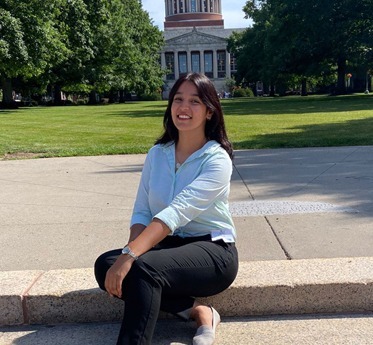

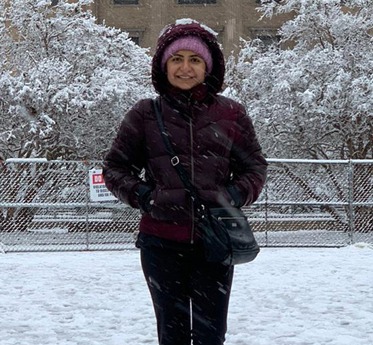
Our Latest Blog
Recently Asked Question
After study can apply for PTS Scheme or Global Investor Program to get PR in Singapore. The applicant must have a job offer and meet the eligibility criteria, which include a good academic record, work experience, and language proficiency.
IELTS requirements vary depending on the university and program in Singapore. While some universities may require an IELTS score for admission, others may accept an optional English language proficiency test or may have language requirements. Check with the specific requirements of the university and program you are interested in.
Yes, Indian/international students can apply to study in Singapore after 10th. Students can choose to study Diploma level courses after 10th or can also apply for their A levels.
Yes, it is possible to work and study in Singapore. International students enrolled in full-time programs at accredited institutions may work part-time during their studies and full-time during breaks and holidays, subject to certain restrictions and obtaining necessary permits from the authorities.




